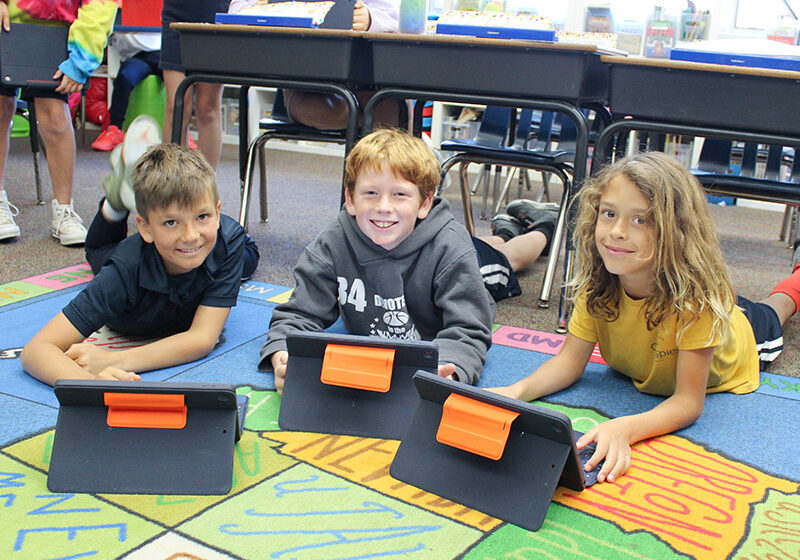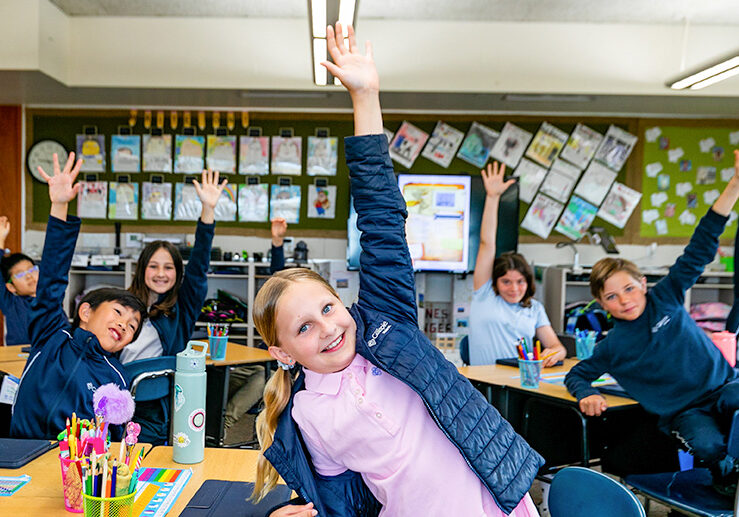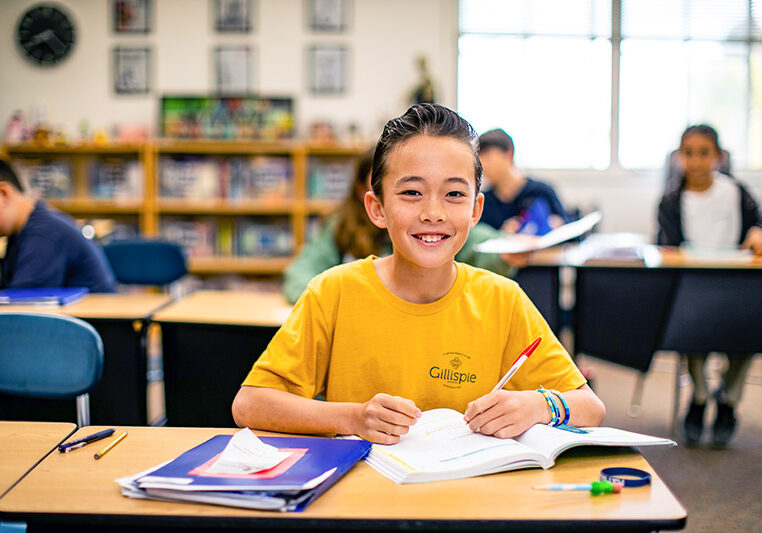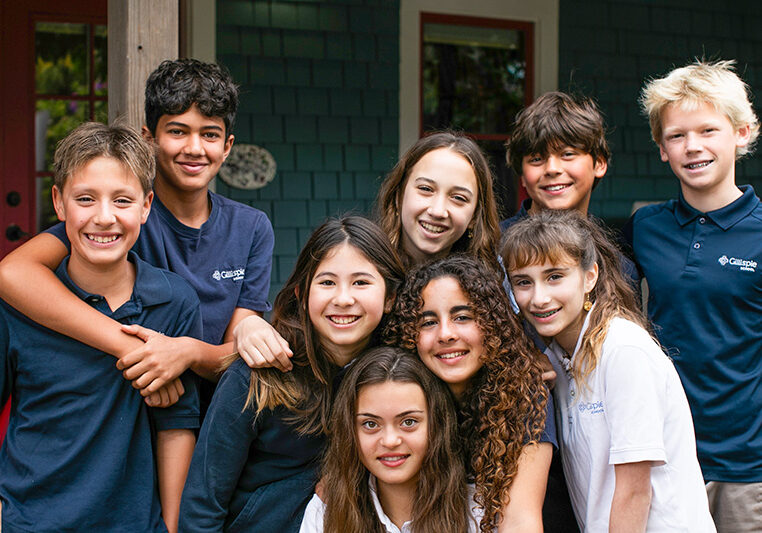UPPER ELEMENTARY
A BALANCED APPROACH
Grades 3-6
Gillispie’s Upper Elementary Program balances academic rigor with robust specialty programs and social-emotional learning. We define academic excellence beyond core subjects, emphasizing the skills and mindsets needed to succeed in an ever-evolving world, such as resilience, empathy, and perseverance. Students graduate Gillispie with the skills and knowledge necessary to thrive in middle school and beyond.
Our specialty classes are an integral part of our curriculum helping to maintain our schoolwide constructivist approach. Through collaborative projects and design thinking challenges, students learn to compose, work together, and develop a strong foundation for higher-level problem-solving and critical thinking. Our teachers empower students to become innovative problem-solvers who can contribute positively to their communities.
We also believe each child’s learning journey is unique, and our teachers are committed to creating a supportive and challenging learning environment where each student can reach their full potential. Through ongoing assessment and differentiation, we tailor instruction to meet the unique needs of every learner.
Grade 3
Mastering New Skills
Third grade is a pivotal year in elementary education as students transition from learning to read to a greater emphasis on reading to learn. Students realize their capabilities and are eager to seek out new challenges and shape their education. The curriculum focus transitions from foundational skills to more complex problem-solving and critical thinking. Through peer review, advanced writing instruction, digital literacy, and real-world math applications, students are challenged on the skills and mindset needed to excel in an ever-changing world.

Grade 3 Program
Grade 2-6 writing focuses on the writing process and emphasizes narrative, opinion, and information as they prepare for multi-paragraph writing.
Students are guided by the Hochman Method, an evidence-based approach that advances thinking through writing by resting on explicit, carefully sequenced instruction, building from sentences to composition.
Grade 3 students refine their reading comprehension and writing skills through a study of both fiction and non-fiction texts. Writing instruction focuses on clarity, organization, and audience awareness, and students learn to refine their work through multiple drafts and peer review. By the end of the year, students clearly articulate their thoughts in writing and drafting persuasive argumentation.
Math in Grade 3 builds on foundational skills learned in previous grades, while introducing more complex concepts with large number place value, addition, subtraction, multiplication, and division. Students develop proficiency in solving multi-step word problems and using strategies like estimation and mental math to solve problems. Geometry and measurement concepts such as area, perimeter, and time are introduced, while data analysis and fractions study lay the groundwork for future algebraic thinking.
Social Studies in Grade 3 focuses on local history and geography. Students develop a strong sense of place by studying San Diego County's features and its diverse population. They also learn about the region's indigenous peoples, their connection to the land, and the impact of historical figures. Students will develop essential map and navigation skills, as well as an understanding of key citizenship and economic concepts.
Specialty classes are an integral part of our curriculum. By partnering with homeroom teachers, specialty teachers enrich core subjects and foster real-world connections through cross-disciplinary learning.
A rotating weekly schedule exposes students to a variety of specialty subjects daily, cultivating their curiosity and fostering capable learners with a growth mindset. Students approach and work through each project with this growth mindset, applying the design-thinking model. In this model, students observe, ask questions, guess, predict, test, and conclude.
Specialty classes include:
- Science & Design: 3 times per cycle
- P.E.: 3 times per cycle
- Music: 2 times per cycle
- Spanish: 2 times per cycle
- Library: once per cycle
- Visual Art: once per cycle
- Digital Citizenship: once per cycle
At school, children learn valuable life skills that go beyond academics. Through interactions with peers and teachers, they develop a sense of community and learn to care for themselves, others, and the environment.
Our Gillispie Values – Integrity, Compassion, Attitude, Respect, and Effort (ICARE) – guide both students and faculty. These values form the foundation of our important work and shape our school culture. We work together as a community to create a joyful learning environment and a vibrant community that embodies kindness, honesty, empathy, hard work, and respect. We strive to exhibit these five ICARE values in all aspects of school life.
Additionally, our Responsive Classroom approach fosters collaboration among students. They learn to solve problems together, build confidence as a team, and create a nurturing environment where everyone feels safe and supported.
Beyond the school day, we offer a wide range of fee-based, enrichment opportunities. From creative arts like painting and ceramics, to theater, sports, movement, and STEM-focused programs like coding and space camp, there’s something for every interest. Our after-school programs and summer camps provide more ways your child can engage in learning opportunities throughout the year. Additionally, students can join our early morning running club!
Age Range
8-9
Schedule
Full-day, 8:30 a.m. - 3:00 p.m.
Extended Care (optional)
7:30-8:00 a.m. and 3:30-5:00 p.m.
Class Sizes
16:1
Educational Philosophy
Social-constructivist, cross-disciplinary
Grade 4
Thriving Through Group Interactions
Fourth grade is a year when students become increasingly responsible for their educational journeys, tackling hands-on projects and engaging with their community as leaders. Students’ understanding of topics is challenged through collaborative work, while teachers continue to differentiate instruction so that each student learns at their best pace.
The curriculum emphasizes strong analytical and persuasive writing and a deeper conceptual understanding and problem-solving in math. An immersive study of California history brings the past to life as cross-curricular projects connect multiple subjects and technology integration enhances each unit of study. Through community involvement and cross-curricular studies, fourth graders build a strong foundation to become informed and engaged citizens.

Grade 4 Program
Grade 2-6 writing focuses on the writing process and emphasizes narrative, opinion, and information as they prepare for multi-paragraph writing.
Literacy in Grade 4 focuses on collaborative novel studies and engaging discussions that often connect to other unit studies like California history. Students are guided by the Hochman Method, an evidence-based approach that advances thinking through writing by resting on explicit, carefully sequenced instruction, building from sentences to composition. Through writing as students explore diverse global themes and issues.
Active listening and in-depth discussions fuel writing across genres. Individualized feedback strengthens the writing process, encouraging students to draft, revise, edit, and publish pieces with strong vocabulary and varied sentence structure. Literacy skills are also applied as fourth graders prepare podcasts related to their unit studies.
Math in Grade 4 places an equal emphasis on conceptual understanding and fluency with skills. Students strengthen their understanding of numbers through operations with whole numbers, decimals, and fractions, while challenging their problem-solving and mental math skills using The Singapore Math approach. Students study geometry, angle measurements, and spatial relationships while analyzing and interpreting data from graphics and tables. Measurement concepts are also solidified as they study length, mass, volume, and time.
Social Studies in Grade 4 explores California history and geography. Students study the state’s evolution from its Indigenous roots through Spanish colonization, the Gold Rush, and the challenges and triumphs of its diverse population. Through engaging cross-curricular projects and field trips, teachers bring these study units to life as students learn about California’s story.
Specialty classes are an integral part of our curriculum. By partnering with homeroom teachers, specialty teachers enrich core subjects and foster real-world connections through cross-disciplinary learning.
A rotating weekly schedule exposes students to a variety of specialty subjects daily, cultivating their curiosity and fostering capable learners with a growth mindset. Students approach and work through each project with this growth mindset, applying the design-thinking model. In this model, students observe, ask questions, guess, predict, test, and conclude.
Specialty classes include:
- Science & Design: 3 times per cycle
- P.E.: 3 times per cycle
- Music: 2 times per cycle
- Spanish: 2 times per cycle
- Library: once per cycle
- Visual Art: once per cycle
- Digital Citizenship: once per cycle
At school, children learn valuable life skills that go beyond academics. Through interactions with peers and teachers, they develop a sense of community and learn to care for themselves, others, and the environment.
Our Gillispie Values – Integrity, Compassion, Attitude, Respect, and Effort (ICARE) – guide both students and faculty. These values form the foundation of our important work and shape our school culture. We work together as a community to create a joyful learning environment and a vibrant community that embodies kindness, honesty, empathy, hard work, and respect. We strive to exhibit these five ICARE values in all aspects of school life.
Additionally, our Responsive Classroom approach fosters collaboration among students. They learn to solve problems together, build confidence as a team, and create a nurturing environment where everyone feels safe and supported.
Beyond the school day, we offer a wide range of fee-based, enrichment opportunities. From creative arts like painting and ceramics, to theater, sports, movement, and STEM-focused programs like coding and space camp, there’s something for every interest. Our after-school programs and summer camps provide more ways your child can engage in learning opportunities throughout the year. Additionally, students can join our early morning running club!
Age Range
9-10
Schedule
Full-day, 8:30 a.m. - 3:00 p.m.
Extended Care (optional)
7:30-8:00 a.m. and 3:30-5:00 p.m.
Class Sizes
16:1
Educational Philosophy
Social-constructivist inspired
Grade 5
Advancing Independence and Learning
Fifth grade is a transformative year of cognitive, social, and emotional growth. As students prepare for the increased independence of middle school, they develop essential organizational and time-management skills. Our curriculum fosters resilience and independence through diverse learning experiences. A significant project this year is Junior Biz Town, an experience where students apply classroom learning in a simulated real-world environment. Through collaborative projects, community service, technology integration, public speaking opportunities, field trips, and more, fifth graders emerge as confident, empathetic, and resilient learners, prepared for middle school.

Grade 5 Program
Literacy in Grade 5 emphasizes authentic and engaged reading and writing. Through shared reading experiences, meaningful conversations, collaborative writing projects, and independent research, students develop an advanced ability to think critically, structure arguments, and craft compelling narratives. Guided by The Hochman Method, the writing curriculum emphasizes grammar, and vocabulary, mechanics, and thinking systemically, to effectively communicate in various formats and compose compelling theses.
Math in Grade 5 focuses on computational fluency as the foundation for strong problem-solving skills. Guided by The Singapore Math method, the curriculum emphasizes conceptual understanding with practical applications. Students study place value, whole number operations, fractions, decimals, ratios, and geometry, as well as how to measure volume, classify shapes, and convert fractions, decimals, and percents. By the end of the year, students can confidently use their knowledge to solve multi-step word problems using various strategies.
Social Studies in Grade 5 is an immersive learning experience through American history. In interactive classroom experiences, students study the diverse histories of Native Americans across different regions, the regional and geographic influences of colonial life, the impact of European explorers and expeditions, and the challenges faced by early settlers. They curriculum culminates in an in-depth study of the American Revolution, the formation of the U.S. Government, and the westward expansion. Through these units, students develop a strong foundation in American history and citizenship.
Specialty classes are an integral part of our curriculum. By partnering with homeroom teachers, specialty teachers enrich core subjects and foster real-world connections through cross-disciplinary learning.
A rotating weekly schedule exposes students to a variety of specialty subjects daily, cultivating their curiosity and fostering capable learners with a growth mindset. Students approach and work through each project with this growth mindset, applying the design-thinking model. In this model, students observe, ask questions, guess, predict, test, and conclude.
Specialty classes include:
- Science & Design: 3 times per cycle
- P.E.: 3 times per cycle
- Music: 2 times per cycle
- Spanish: 2 times per cycle
- Library: once per cycle
- Visual Art: once per cycle
- Digital Citizenship: once per cycle
At school, children learn valuable life skills that go beyond academics. Through interactions with peers and teachers, they develop a sense of community and learn to care for themselves, others, and the environment.
Our Gillispie Values – Integrity, Compassion, Attitude, Respect, and Effort (ICARE) – guide both students and faculty. These values form the foundation of our important work and shape our school culture. We work together as a community to create a joyful learning environment and a vibrant community that embodies kindness, honesty, empathy, hard work, and respect. We strive to exhibit these five ICARE values in all aspects of school life.
Additionally, our Responsive Classroom approach fosters collaboration among students. They learn to solve problems together, build confidence as a team, and create a nurturing environment where everyone feels safe and supported.
Age Range
10-11
Schedule
Full-day, 8:30 a.m. - 3:00 p.m.
Extended Care (optional)
7:30-8:00 a.m. and 3:30-5:00 p.m.
Class Sizes
15:1 or lower
Educational Philosophy
Social-constructivist inspired
Grade 6
Inspiring the leaders of tomorrow
Sixth grade at Gillispie is our senior year, and it’s a special one! It’s a unique blend of middle school rigor and elementary school whim and warmth. Students engage in purposeful work that develops critical thinking, leadership, and communication skills through engaging, real-world projects. The curriculum emphasizes authentic writing, digital literacy, peer discussions, and mathematical problem-solving. Through collaborative learning, community engagement, and experiential opportunities, including overnight field trips and design projects, students graduate as joyful, empathetic, and resilient learners prepared for middle school and beyond.

Grade 6 Program
Literacy in Grade 6 fosters a deep appreciation for literature, and focuses on authentic writing. In workshop settings, students will explore a variety of texts, including poetry, novels, short stories, and myths. They will analyze author techniques, make inferences, and present their opinions and research both in writing and verbally. The curriculum emphasizes research, narrative, informative, and persuasive writing, and presenting research findings effectively. By the end of the year, students will develop strong, individual voices through active listening, dialogue, and empathy, becoming confident and articulate communicators.
Math in Grade 6 builds a strong foundation for algebra and middle school curriculum. Students complete more advanced work on numbers through operations with fractions, decimals, and percents. They explore geometric concepts, including measurement, spatial reasoning, and data analysis. Problem-solving skills are practiced through real-world applications, preparing them for higher-level math.
Social Studies in Grade 6 explores ancient civilizations and their enduring legacies. Students study the histories of Egypt, Kush, Canaan, India, China, Greece, and Rome, and analyze the impact of geography, culture, and government. Through interactive experiences, the curriculum focuses on understanding the foundations of these civilizations and providing students with a global perspective and understanding of the building blocks of our world history.
Grade 6 students attend specialty classes weekly, where they develop an awareness of a wide range of content and build essential skills.
Specialty classes are an integral part of our curriculum. By partnering with homeroom teachers, specialty teachers enrich core subjects and foster real-world connections through cross-disciplinary learning.
A rotating weekly schedule exposes students to a variety of specialty subjects daily, cultivating their curiosity and fostering capable learners with a growth mindset. Students approach and work through each project with this growth mindset, applying the design-thinking model. In this model, students observe, ask questions, guess, predict, test, and conclude.
- Science & Design: 3 times per cycle
- P.E.: 3 times per cycle
- Music: 2 times per cycle
- Spanish: 2 times per cycle
- Library: once per cycle
- Visual Art: once per cycle
- Digital Citizenship: once per cycle
- Drama: once per cycle
At school, children learn valuable life skills that go beyond academics. Through interactions with peers and teachers, they develop a sense of community and learn to care for themselves, others, and the environment.
Our Gillispie Values – Integrity, Compassion, Attitude, Respect, and Effort (ICARE) – guide both students and faculty. These values form the foundation of our important work and shape our school culture. We work together as a community to create a joyful learning environment and a vibrant community that embodies kindness, honesty, empathy, hard work, and respect. We strive to exhibit these five ICARE values in all aspects of school life.
Additionally, our Responsive Classroom approach fosters collaboration among students. They learn to solve problems together, build confidence as a team, and create a nurturing environment where everyone feels safe and supported.
Age Range
11-12
Schedule
Full-day, 8:30 a.m. - 3:00 p.m.
Extended Care (optional)
7:30-8:00 a.m. and 3:30-5:00 p.m.
Class Sizes
14:1
Educational Philosophy
Social-constructivist inspired